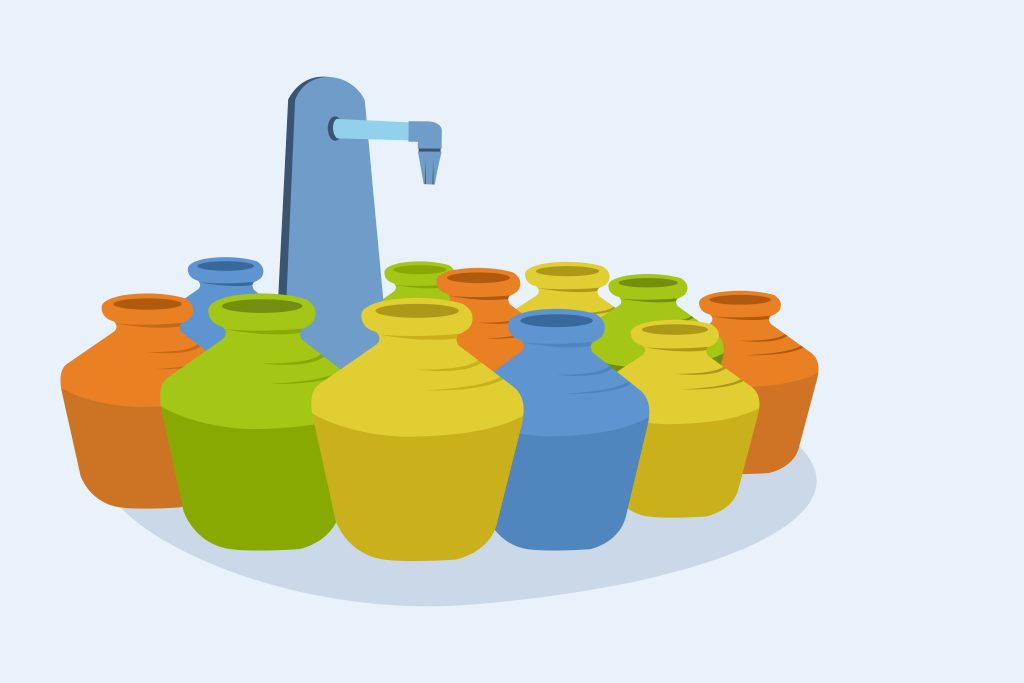Aparna Sharma sheds light on how the fast fashion industry’s impact on the world’s water supply.
What will you tell your children when the last drop of water runs out? Would you look at them and say that you really needed that fifth pair of jeans from Zara? According to researchers, a pair of jeans requires 7,600 litres of water to make it through the production line. The water-intensive manufacturing process is especially worrying at a time when the world is facing a freshwater crisis.
A UN report mentioned that fast fashion accounts for 20 percent of the world’s contaminated water. It’s a well-known fact that fast fashion companies have prioritised profit over human and ecological wellbeing. The chemicals used on most clothes are extremely toxic, and this pollutes water bodies like rivers and lakes. Local communities living near these places often struggle to get clean water. The garments are usually dyed with toxic chemicals and washed, and the chemical-infused water is usually thrown into local water bodies. According to a report by the UN, half a million tonnes of microfibres are released into the waterways every year. The local communities can no longer rely on the local river water for drinking and cooking, and the consumption of contaminated water also increases the risk of cancer and cholera.
The Hidden Water Cost of Growing Cotton
Most people think cotton is a sustainable crop but that is simply not true. The extreme dependence on pesticides has made cotton a thirsty crop. In 2015, The Guardian reported that severe water scarcity in India is exacerbated by the cotton industry. There are efforts to move towards organic cotton, but a large percentage of cotton grown on the planet remains unsustainable because of the amount of water required to grow it. Producing 1kg of cotton in India consumes 22,500 litres of water according to the Water Footprint Network. The cotton T-shirt we all have in our cupboard was made with 2700 litres of water. That is equivalent to how much water an average person would drink in two years. The processing of raw cotton into a T-shirt and dyeing it also requires water. A large part of water pollution takes place during this stage: the world uses around 5 trillion litres of water each year for fabric dyeing.
How Bad is the Worldwide Water Scarcity?
A report by the Global Fashion Agenda in 2015 mentioned that the fashion industry consumed 79 cubic metres of water that year. This is enough water to fill 32 million Olympic-size swimming pools. This figure is expected to increase by 50 percent by 2030. According to the WWF, while water covers 70 percent of our planet, freshwater, the water we drink and use for irrigation, is incredibly rare. As a result, 1.1 billion people worldwide already lack access to water, and a total of 2.7 billion find water scarce for at least one month of the year. Many of the water systems that keep ecosystems thriving and feed a growing human population have become stressed due to industries like fast fashion, which continue to contaminate water.
Elon Musk recently said there is plenty of water and the world will never run out of water. This statement is extremely concerning and experts are questioning his logic. Groundwater levels in certain areas of Germany have been dropping for the past three decades due to climate change. Musk claims that desalination is the solution to the global water crisis, but Musk’s optimism on this topic is countered by environmental leaders who believe that water scarcity is a pressing global issue and desalination has not yet proven successful.
What Can You Do?
Opt for second-hand whenever possible. There are so many swap events and thrift stores in Bangkok, get out of your comfort zone and check them out. You will be surprised by the beautiful and mildly-used clothes you will find. Buy from slow fashion brands who use organic cotton and are committed to taking care of the environment. Look for GOTS-certified organic cotton when you are buying T-Shirts.
Aparna Sharma (Instagram: @stylishsuitcase) is a non-conformist who believes that fashion must become a force for good and style must meet sustainability. She breaks down the nuances of slow fashion and how we can stay stylish without being trendy.








